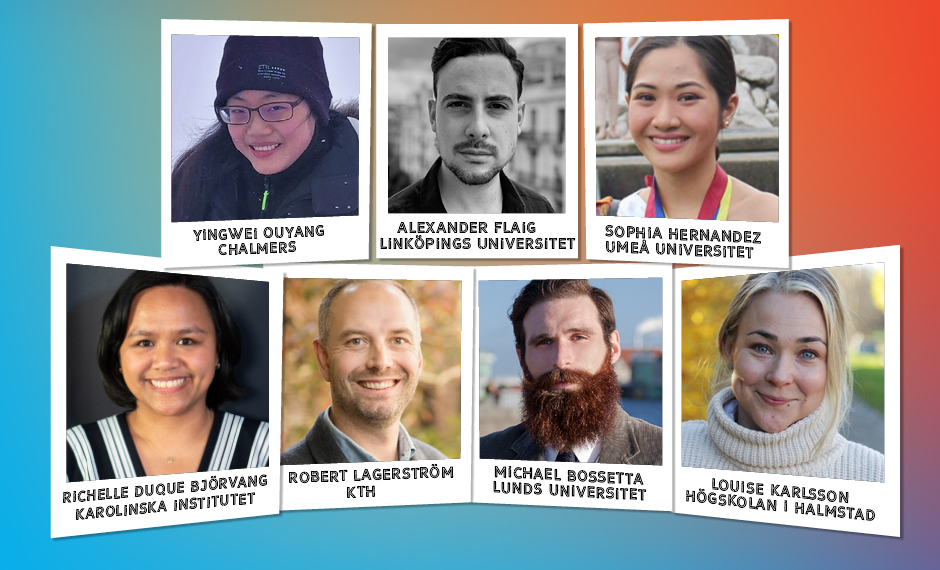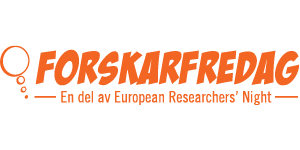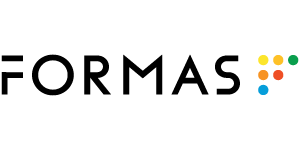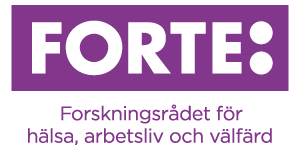The countdown has begun. On 25 November, seven finalists will take to the stage to present their research in the most exciting and comprehensible way possible – in just four minutes! Join in and vote for your favourite in the Researchers’ Grand Prix.

Each of the finalists have won regional heats of Researchers’ Grand Prix competitions held in 2020 and 2021. Due to the pandemic, no final could be held last year. Therefore, the best contestants from both years will meet in a final on 25 November in Stockholm.
The seventh and last finalist, Michael Bossetta, won his place in the Helsingborg/Lund heat held in October this year. In addition to winning, the competition gave him an insight into research being undertaken at Lund University other than his own.
“Presentations covered diverse topics from the Arctic ecosystem to cyber security and alternative financial systems in emerging economies. Although they were only four minutes long, I learned a lot about different problems that research is helping to solve,” said Michael Bossetta, whose own research is on how politicians use social media.
The first finalists have been waiting almost a year for the grand final. Sophia Hernandez won the Umeå regional heat last autumn. She is developing tools to study genes in parasites that spread malaria. During the competition, she was both nervous and excited:
“I think research should be shared so that everyone can appreciate it. It was definitely a challenge to prepare, simplify and cut-down to a four-minute presentation, but mainly it was a fantastic experience!” she commented.
It was definitely a challenge to prepare, simplify and cut-down to a four-minute presentation, but mainly it was a fantastic experience!
Robert Lagerström, who researches cyber attacks, partly by hacking into systems himself, won the Stockholm heat held in conjunction with ForskarFredag 2020, part of European Researchers’ Night.
“It was a great feeling! The whole afternoon was fun but it was also very nerve-wracking. All the participants did so well so it was not at all obvious who was going to win.”
Yingwei Ouyang and Alexander Flaig progressed from the online heat held in 2020, N.Ö.R.D, where researchers from across the country could apply by submitting four-minute presentations of their research. The videos were judged by an expert jury with the top two winning a place in the final.
“In the final, I hope to be able to entertain the audience and it would be a great bonus if they learn something about my research and want to find out more,” said Yingwei Ouyang, who jokingly calls her research “couples therapy for plastics” because she is trying to marry two plastic materials with different characteristics to create a durable insulation material for electric cables.
In the final, I hope to be able to entertain the audience and it would be a great bonus if they learn something about my research and want to find out more.
Finalist Alexander Flaig talked about his research on how to create sustainable markets. Instead of a PowerPoint presentation, he used ingredients that he mixed into a bread dough. “Sometimes, a really absurd idea can help to explain abstract concepts best!” he explained.
During this year’s online heat, Researchers’ Grand Prix Digital, the public could vote for the winners online. In September, during the week of ForskarFredag, several thousand people rated the contestants’ presentations (still available to watch online) When the votes were combined with those of an expert jury, Louise Karlsson and Richelle Duque Björvang emerged as the winners.
“It feels incredibly fun and exciting, almost a bit surreal. But I’m really looking forward,” said Louise Karlsson, who researches stress-related diseases at Halmstad University. She signed up both for personal development and to get tips and advice on presentation techniques.
Richelle Duque Björvang from Karolinska Institutet is investigating the relationship between exposure to chemicals and women’s fertility. She is also looking forward to the experts’ feedback to help her become better at communicating her research.
“I think it is very important that researchers share all the exciting research that is going on with the world. As the Researchers’ Grand Prix is a national competition, which reaches out across the whole of Sweden and even beyond, the competition is also a good platform for me to raise awareness on how chemicals affect women’s health,” she said.
I think it is very important that researchers share all the exciting research that is going on with the world
The finalists have all received presentation coaching and the grand final at Nalen in Stockholm on 25 November is just around the corner. At 2pm CET, compère Josefin Johansson will kick off the show. An expert jury will also be on stage to judge the presentations together with the audience. The jury consists of comedian and author, Karin Adelsköld, Professor of Theoretical Physics at Uppsala University, Ulf Danielsson, and science reporter at Expressen, Amina Manzoor.
Watch the final live
The final can be watched live online at www.forskargrandprix.se/live. Menticode: 1259 8452
25 November 14:00-16:00 CET.
The seven finalists in the Researchers’ Grand Prix 2020/2021 are:
Michael Bossetta, Associate Senior Lecturer, Lund University
Richelle Duque Björvang, PhD student, Karolinska Institutet
Alexander Flaig, PhD student, Linköping University
Sophia Hernandez, research assistant, Umeå University
Robert Lagerström Lecturer, KTH Royal Institute of Technology
Louise Karlsson occupational therapist and PhD student, Halmstad University
Yingwei Ouyang, PhD student, Chalmers University of Technology
The Researchers’ Grand Prix has been coordinated by the Swedish non-profit organisation VA (Public & Science) in collaboration with the research councils Formas, Forte, Vinnova and the Swedish Research Council since 2012.





